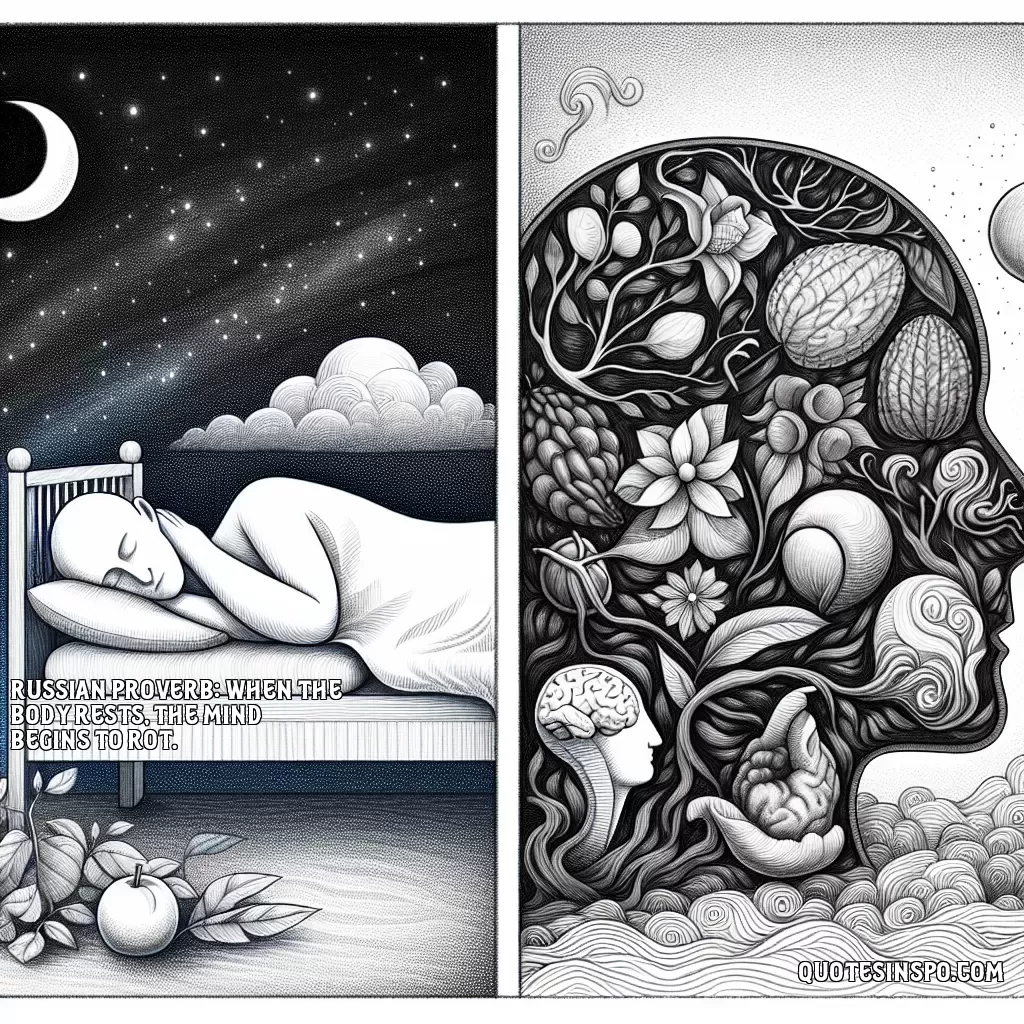
Russian Proverb: When the body rests, the mind begins to rot.
The Russian proverb "When the body rests, the mind begins to rot" highlights the importance of maintaining activity for both physical and mental well-being. At its core, this saying suggests that inactivity, particularly physical inactivity, can lead to the deterioration of mental acuity and overall cognitive health. The proverb implies a connection between physical activity and mental vitality, reflecting the idea that the mind is akin to a muscle that requires regular exercise to remain strong and sharp. When the body is idle, the mind can become sluggish, leading to a decline in mental sharpness, creativity, and problem-solving abilities. This perspective is supported by various studies in neuroscience and psychology, which have found that physical exercise can enhance brain function, improve mood, and increase cognitive abilities. Additionally, the proverb can be interpreted as a caution against complacency and stagnation. It promotes the idea of lifelong learning and continuous engagement in activities that challenge the mind, reinforcing the notion that personal development is an ongoing process. It serves as a reminder that rest and relaxation should be balanced with active pursuits that keep both the body and mind engaged. Ultimately, the proverb underscores the belief in the holistic connection between physical and mental health. By encouraging a lifestyle that includes regular physical activity and mental challenges, it calls for a balanced approach to life that fosters overall well-being and personal growth.
Quote By: Russian Proverb
**Russian Proverb: Echoes of Wisdom Through the Ages**
Russian proverbs are a rich tapestry of cultural wisdom and life lessons, woven through centuries of oral tradition and folk culture. These nuggets of wisdom, often characterized by their concise and poignant nature, encapsulate the spirit of Russian life and reflect the values, struggles, and joys of the people. They serve not only as moral guidance but also as a means of social cohesion, preserving the collective knowledge of generations past.
One remarkable aspect of Russian proverbs is their ability to convey complex ideas in simple terms. Many Russian proverbs have transcended regional dialects and historical contexts, finding relevance even in modern times. For instance, the proverb "Better to be poor but free than rich but a slave" reflects the enduring spirit of independence deeply rooted in Russian history. Such sayings resonate with individuals seeking to navigate the challenges of life, reinforcing the notion that character and values often outweigh material wealth.
Scholar and folklorist Vladimir Propp made significant contributions to understanding Russian proverbs by analyzing their structure and function within the narrative traditions of the country. Through his work, Propp highlighted how proverbs serve as both literary devices and practical advice that guide people in their daily lives. The cultural significance of Russian proverbs can also be seen in the works of renowned Russian authors like Leo Tolstoy and Anton Chekhov, who often incorporated these sayings into their stories, thereby preserving and popularizing them for future generations.
Russian proverbs are not merely relics of the past; they continue to influence contemporary Russian society. In an age of rapid change and globalization, these proverbs remain a source of wisdom, urging individuals to reflect on their values and choices. As people around the world seek meaning and guidance, Russian proverbs stand as a testament to the universal quest for understanding and truth.
In conclusion, the legacy of Russian proverbs, explored by scholars like Vladimir Propp and echoed in the literary works of authors such as Tolstoy and Chekhov, is a valuable aspect of Russian heritage. These distillations of life wisdom continue to resonate, illustrating the timeless nature of human experience and the sharing of knowledge across cultures and generations.